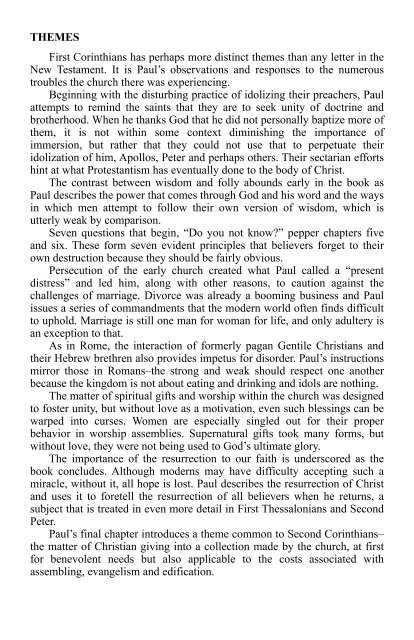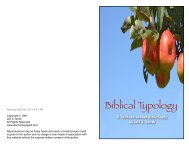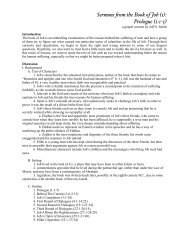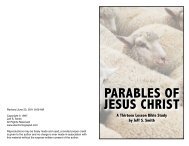New Testament Study Guides - ElectronicGospel
New Testament Study Guides - ElectronicGospel
New Testament Study Guides - ElectronicGospel
Create successful ePaper yourself
Turn your PDF publications into a flip-book with our unique Google optimized e-Paper software.
THEMES<br />
First Corinthians has perhaps more distinct themes than any letter in the<br />
<strong>New</strong> <strong>Testament</strong>. It is Paul’s observations and responses to the numerous<br />
troubles the church there was experiencing.<br />
Beginning with the disturbing practice of idolizing their preachers, Paul<br />
attempts to remind the saints that they are to seek unity of doctrine and<br />
brotherhood. When he thanks God that he did not personally baptize more of<br />
them, it is not within some context diminishing the importance of<br />
immersion, but rather that they could not use that to perpetuate their<br />
idolization of him, Apollos, Peter and perhaps others. Their sectarian efforts<br />
hint at what Protestantism has eventually done to the body of Christ.<br />
The contrast between wisdom and folly abounds early in the book as<br />
Paul describes the power that comes through God and his word and the ways<br />
in which men attempt to follow their own version of wisdom, which is<br />
utterly weak by comparison.<br />
Seven questions that begin, “Do you not know?” pepper chapters five<br />
and six. These form seven evident principles that believers forget to their<br />
own destruction because they should be fairly obvious.<br />
Persecution of the early church created what Paul called a “present<br />
distress” and led him, along with other reasons, to caution against the<br />
challenges of marriage. Divorce was already a booming business and Paul<br />
issues a series of commandments that the modern world often finds difficult<br />
to uphold. Marriage is still one man for woman for life, and only adultery is<br />
an exception to that.<br />
As in Rome, the interaction of formerly pagan Gentile Christians and<br />
their Hebrew brethren also provides impetus for disorder. Paul’s instructions<br />
mirror those in Romans–the strong and weak should respect one another<br />
because the kingdom is not about eating and drinking and idols are nothing.<br />
The matter of spiritual gifts and worship within the church was designed<br />
to foster unity, but without love as a motivation, even such blessings can be<br />
warped into curses. Women are especially singled out for their proper<br />
behavior in worship assemblies. Supernatural gifts took many forms, but<br />
without love, they were not being used to God’s ultimate glory.<br />
The importance of the resurrection to our faith is underscored as the<br />
book concludes. Although moderns may have difficulty accepting such a<br />
miracle, without it, all hope is lost. Paul describes the resurrection of Christ<br />
and uses it to foretell the resurrection of all believers when he returns, a<br />
subject that is treated in even more detail in First Thessalonians and Second<br />
Peter.<br />
Paul’s final chapter introduces a theme common to Second Corinthians–<br />
the matter of Christian giving into a collection made by the church, at first<br />
for benevolent needs but also applicable to the costs associated with<br />
assembling, evangelism and edification.









